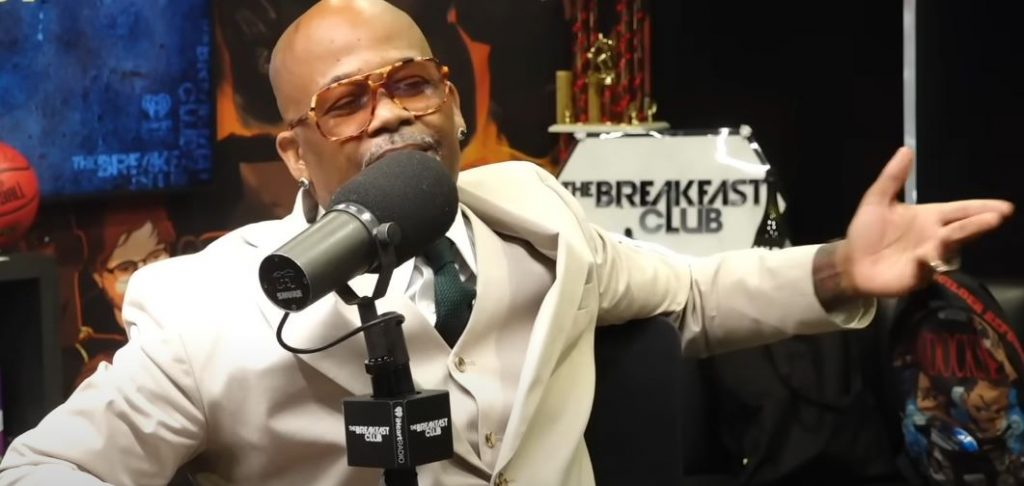
Damon Dash’s financial situation took a sharply sharp turn in 2025 when he declared Chapter 7 bankruptcy, exposing more than $25 million in debt and just $4,350 in assets. Dash’s reputation as one of hip-hop’s most audacious and ambitious moguls in the late 1990s stood in stark contrast to this revelation. Beneath the mayhem, however, is a tale of fortitude, vision, and the unwavering quest for autonomy—qualities that influenced both his ascent and decline.
The establishment of Roc-A-Fella Records, which Damon Dash co-founded in 1995 with Jay-Z and Kareem “Biggs” Burke, is still closely associated with his name. Dash assisted in turning the business into a cultural force by fusing astute branding with streetwise business acumen. Reasonable Doubt, Jay-Z’s debut album, became an underground classic, and the label signed artists like Beanie Sigel and Kanye West. At a time when not many people believed in independent rap entrepreneurs, Dash’s ability to confidently and aggressively market music was remarkably effective.
| Category | Details |
|---|---|
| Full Name | Damon Anthony Dash |
| Date of Birth | May 3, 1971 |
| Birthplace | New York City, United States |
| Profession | Entrepreneur, Record Executive, Film Producer |
| Known For | Co-founding Roc-A-Fella Records with Jay-Z and Kareem Burke |
| Education | Private schooling in New York |
| Partner | Raquel Horn (2015–present) |
| Former Spouse | Rachel Roy (2005–2009) |
| Children | 5, including Dame “Boogie” Dash and Ava Dash |
| Net Worth (2025) | -$25 million (per bankruptcy filing) |
In the ensuing ten years, Dash, who advocated for independence while living in luxury, rose to prominence as a hip-hop entrepreneur. His versatility was demonstrated by his forays into the fashion industry with Rocawear and the film industry with Paid in Full and State Property. Particularly profitable was the Rocawear brand, which reportedly brought in hundreds of millions of dollars a year before being sold in 2007 for $204 million. Dash’s success story encouraged young Black entrepreneurs to take charge of their creativity, and for a while, he seemed unstoppable.
However, as the industry changed, fractures started to appear. The relationship quickly soured when Jay-Z took over as president of Def Jam Records in 2004. Later, for $30 million, Jay-Z acquired Dash’s share of Rocawear, essentially ending a generation-defining partnership. The emotional and financial split signaled the start of Dash’s downward trajectory. His empire started to fall apart without Roc-A-Fella’s infrastructure.
By the middle of the decade, financial strain was increasing. Foreclosed properties, repossessed cars, and unpaid taxes were reported. One particularly significant loss was the $5.5 million foreclosure sale of his $9 million Tribeca mansion. Dash persisted in starting new businesses in spite of these obstacles, including media platforms and art collectives. Even though he was incredibly persistent, many of his projects never really took off.
His September 2025 bankruptcy filing provided a startling glimpse into his difficulties. Approximately $19 million in unpaid taxes from several states, $650,000 in past-due child and spousal support, and millions more from court rulings were among his debts. In addition to large amounts owed to former partners and lawyers, he owed filmmaker Josh Webber almost $5 million for copyright and defamation disputes. The data showed a man who was reluctant to give up his entrepreneurial identity despite being overburdened by financial and legal obligations.
In 2024, a particularly contentious chapter occurred when Dash’s remaining 33.3% ownership of Roc-A-Fella Records was put up for auction by the US Marshals Service. The sale rekindled public tension between Dash and Jay-Z and was intended to satisfy a $800,000 civil judgment. Dash claimed that his ex-partner had weakened the auction’s worth and, consequently, his capacity to pay off his debts. The dispute served as a reminder of how ambition and ego can cause business alliances founded on common goals to fall apart.
Nonetheless, Damon Dash’s impact is still ingrained in hip-hop business culture. In a time when artists like Tyler the Creator and Chance the Rapper are successful on their own, his insistence that artists must own their work was especially novel for its day and still has resonance today. Despite the financial cost, Dash’s audacity and defiance changed how people thought about power relationships in music. Ironically, his mistakes taught others about long-term planning, structure, and sustainability.
Dash continued to be creative even as his wealth declined. He and his band, The Black Guns, released the rock-infused album 365 in 2025, which featured rapper Freeway. The project demonstrated his unwavering dedication to independent artistic experimentation. It also served as a reminder that, despite the scars from bankruptcy, money was never the only thing that defined him. Dash has always valued artistic freedom over financial security, a principle he still fervently espouses.
Even though it is frequently tumultuous, his personal life shows a man who has been molded by loss and rebirth. He still talks lovingly about the emotional impact of his relationship with the late R&B singer Aaliyah. Despite their tense divorce, his marriage to designer Rachel Roy left him with two daughters and a lasting creative legacy thanks to her success in fashion. A side of Dash that is frequently disregarded but is profoundly human and occasionally vulnerable is reflected in his tenacity as a father and creative collaborator.
The disparity between Jay-Z and Damon Dash, who are currently valued at an estimated $2.5 billion, is remarkably representative of two different routes from the same starting point. Dash represented rebellious independence, while Jay was an expert at corporate diplomacy. Greatness came from both schools of thought, but only one was financially viable. However, fans who respect integrity over conformity have long admired Dash for his unwavering authenticity.